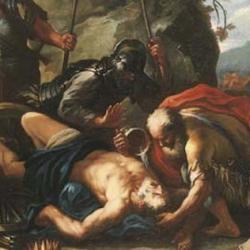William Johnstone (1 & 2 Chronicles, Volume 1) argues that the Chronicler depicts Israel’s warfare as “sacramental.” The brief account of the war with the Hagrites in 1 Chronicles 5:18-22 is an early example.
“Israel is the agent of the LORD’S rule on earth,” he writes, adding that “It is the ‘outward and visible sign’, the earthly counterpart, of the hidden cosmic reality and power of the LORD of hosts. In a word, C’s theology of Israel is sacramental. Since the seen and the unseen are but the two sides of the one indivisible reality, in order to be the fitting agent of this cosmic power, Israel must be totally prepared and equipped with the best of all the temporal forces available. But, at the same time, Israel must be wholly reliant upon God, not upon her own strength. This paradox can only be resolved in sacramental terms: it is because Israel is totally in tune with the cosmic direction of the universe that she is unconquerable on the field of battle” (75).
Johnstone sees a “sacramental” pattern in the way the Chronicler describes the skills and armaments of the armies involved: “The forces of Israel on the East Bank are portrayed in terms of total battle readiness: the very first phrase to describe them, bene hayil (‘valiant warriors’ [NRSV], v. 18), already has a sacramental significance expressing both the innate calibre of the troops and the outward status and armaments that perfectly express that inner quality” (75).
Verse 18 describes the warriors as “ready for service,” but Johnstone thinks that something else is hinted at in the description: “Two key terms are involved. The verb ‘to advance’ (ys’) has already been met in 1 Chron. 1.12. The term ‘host,’ introduced for the first time, perfectly expresses sacramental theology: the plural ‘hosts’ (fba’ot) is part of the divine title, ‘LORD of hosts,’ which occurs in 1 Chron. 11.9 and elsewhere, where the reference is to the cosmic powers that God has at his disposal. Israel’s army on earth is thus—ideally, at any rate—the local expression of those powers, embodying God’s will and discharging his purpose. It is no wonder that those who are called to this service must have the Levites in their midst” (76). Yahweh has heavenly hosts, and Israel is the visible sign of that heavenly host, the “sacrament” of God’s rule over the nations.
Sacramental war is prosecuted in faith: “they acknowledge that the outcome of a battle is a matter of God’s decision, regardless of the relative strength of the forces involved (the point is repeated in a similar ‘because’ clause at the end of v. 22a: ‘because the battle is from God’: it is fought at his instigation, in his name, in his power, and the successful result is the inevitable consequence of his decision). Thus, with a sense of total dependence, in the heat of battle they ‘cry’ to God, that is, they invoke his help (z’q, 2 Chron. 18.31; 20.9; 32.20; compare the similar use of the verb qr’ in 1 Chron. 4.10); God allows himself ‘to be entreated’ (cf. the repentant Manasseh in 2 Chron. 33.13,19) and ‘sends help’” (77). It is God’s war, and He ensures the victory.
By the same token, unfaithfulness will mean military and national disaster: “as soon as apostasy creeps in, forfeiture of territory is, according to sacramental theology, inevitable (v. 22b). It is such apostasy that the following section is about to expound” (78).
Summarizing, Johnstone writes, “It is not quietism or passivity that is being commended: only those who are in that state of receptivity which comes from total commitment and preparedness, yet who are convinced that the outcome depends entirely upon the being and nature of God, can expect to prevail over adversity and circumstance” (78-9).














